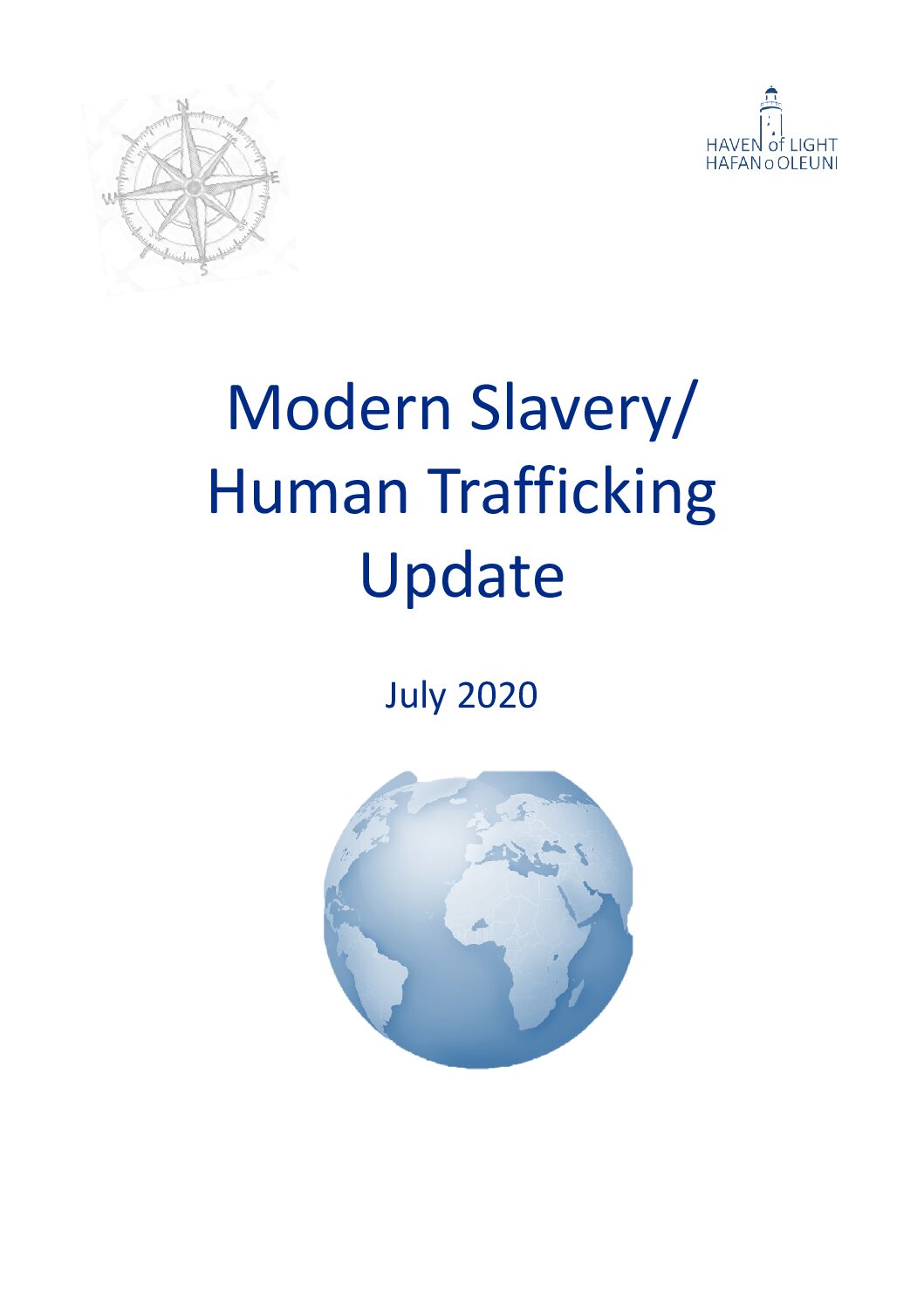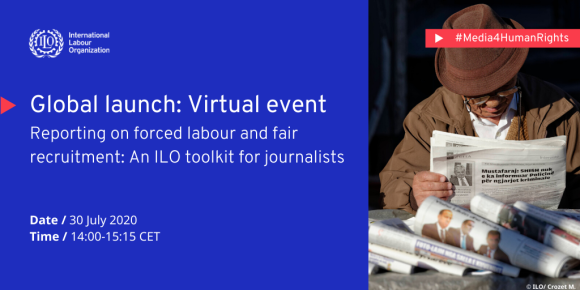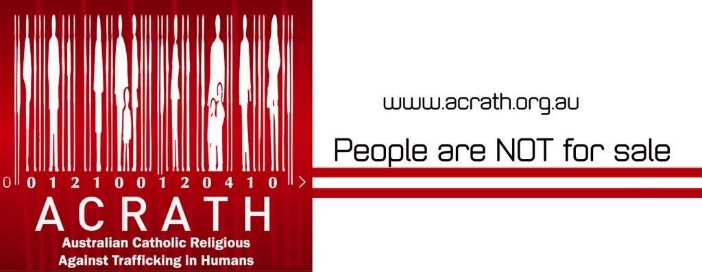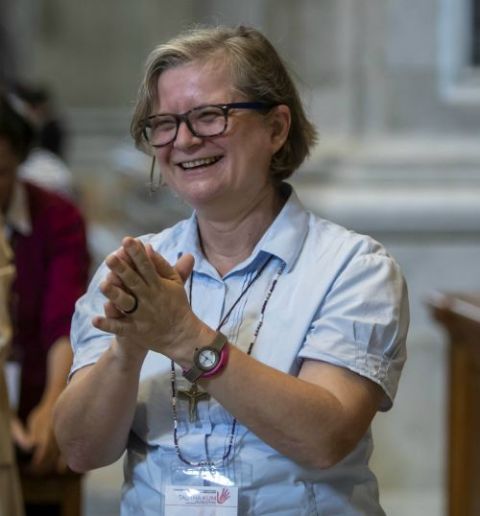STOP Trafficking Newsletter August 2020 2020_08_Stop Trafficking EN
STOP Trafficking Newsletter August 2020


STOP Trafficking Newsletter August 2020.
Anti-Trafficking Newsletter, August 2020. Vol. 18, No.8.
This month’s Newsletter offers a retrospective on the past two decades of the TIP Report (Trafficking in Person’s Report). From its initial report in July 2001, which covered 82 country narratives, right through to the most recent report which reports on countries, it is clear there is a value in calling governments worldwide, to accountability and action against Human Trafficking. The Newsletter publishes the concerns raised by Polaris and ATEST (Alliance To End Slavery and Human Trafficking), calling for more investigation into labour trafficking and the need to hold businesses accountable for labour trafficking abuses.
Interspersed with the profiles of the 2020 TIP Heroes, we read about how some Peace Keepers and civilian personnel are complicit in human trafficking; the relationship between addition and human trafficking; an analysis of Tier placement plus country listings; Faith-based efforts to combat human trafficking; and what the TIP report says about reengineering healthcare for survivors of human trafficking.
Chillingly, the report includes reference to countries where governmental armed forces, police or other security forces or government supported armed groups that recruit or use child soldiers and the measures to be taken to reduce such governmental activities.
Finally, there is the story of Maria, a survivor of labour trafficking and her journey to this stage where Maria is now a survivor leader in her community.


UN Women @ 10 Online Book Section
Submissions are open now!
To mark UN Women’s 10th anniversary, civil society is leading the development of an online book for UN@75, titled Thank You, United Nations. We are expanding the book and adding a section for UN Women, titled: “Women Changed the UN – and the UN helped Women Change the World.” The section will reflect on the history of UN Women, recount its impact on the lives of women and families, and provide a look to the future. Download the concept note for more information.

UN ILO Labour Convention 182 on the worst forms of child labour receives universal ratification.
Formally known as Convention No. 182, the treaty, adopted two decades ago, achieved universal ratification on Tuesday, 4 August 2020, making it the most rapidly ratified Convention in the UN agency’s 101-year history.
Convention No. 182 calls for the prohibition and elimination of the worst forms of child labour, which includes slavery, forced labour and trafficking.
It forbids the use of children under18 in armed conflict, prostitution, pornography, illicit activities such as drug trafficking, and in hazardous work.
“Universal ratification of Convention 182 is an historic first that means that all children now have legal protection against the worst forms of child labour,” said ILO Director-General Guy Ryder.
“It reflects a global commitment that the worst forms of child labour, such as slavery, sexual exploitation, the use of children in armed conflict or other illicit or hazardous work that compromises children’s health, morals or psychological wellbeing, have no place in our society.”
This universal ratification must surely be a source of hope and possibilities for combatting modern slavery, as the collaborative efforts by all 187 signatories to the Convention represent a powerful force for change and implementation.
Millions of child workers
Ending child labour has been one of the main goals of the ILO, which was founded in 1919.
The UN agency estimates that 152 million children worldwide are affected, with 73 million in hazardous work.
Most child labour takes place in the agriculture sector, mainly due to poverty and parents’ difficulties in finding decent work.
Drop in child labour
The Convention was adopted by ILO member states meeting in Geneva in 1999.
It is one of the organization’s eight Fundamental Conventions, which cover issues such as the elimination of forced labour, the abolition of work-related discrimination and the rights to freedom of association and collective bargaining.
The Pacific island nation Tonga deposited its ratification instruments with the ILO on Tuesday, becoming the final country to do so.
The ILO said incidence of child labour and its worst forms dropped by almost 40 per cent between 2000 and 2016 as ratification rates increased and countries adopted laws and policies, including relating to minimum age to work.
Video reporting: https://twitter.com/i/status/1290633588027793409
Full report at: https://news.un.org/en/story/2020/08/1069492

WEBINAR TO LAUNCH THE ILO TOOLKIT FOR JOURNALISTS Thursday 30 July 2020 from 14:00 – 15:15, CET. |
To REGISTER: http://ilo.msgfocus.com/c/1G9fIo5CMZaFAoJOKZMgph40
To commemorate the World Day Against Trafficking in Persons, the ILO is organising a webinar to launch the new toolkit for journalists Reporting on Forced Labour and Fair Recruitment.
The ILO has developed this toolkit in a collaborative effort with contributions from professional journalists, communication professionals and topic experts. It has been pilot tested through media training workshops in a number of countries in all regions of the world. The toolkit is now available in English, French, Spanish (draft version) and Arabic. It has been adapted to the national context in Nepal and Sri Lanka. This week, the ILO will carry out a social media campaign to raise awareness of the tool and the importance of supporting quality reporting on forced labour and fair recruitment in achieving Target 8.7. This will include video messages from journalists from all regions of the world as well as celebrities and other supporters of quality media reporting on these topics. Please support the campaign by following @ILO on Twitter and retweeting campaign messages. |

World Day against Trafficking in Persons- 30 July 2020.
As we prepare to mark this year’s World day against Trafficking in Persons, 30 July 2020, ACRATH members (Australian Catholic Religious against Trafficking in Humans) have prepared a ten-minute Prayer for the World Day Against the Trafficking in Persons on July 30 and invite us to attend via ZOOM.
If you are unable to attend the zoom prayer gathering you are welcome to use the material on the ACRATH website (acrath.org.au) and lead your community in prayer.
Zoom details
Topic: World Day Against Trafficking in Persons
Time: Jul 30, 2020 12:00 PM Canberra, Melbourne, Sydney
Join Zoom Meeting
https://us02web.zoom.us/j/83965877041
Meeting ID: 839 6587 7041

106th World Day of Migrants and Refugees (WDMR), 27 September 2020. The 106th World Day of Migrants and Refugees (WDMR) will be celebrated on Sunday 27th September 2020. With the title “Like Jesus Christ, forced to flee”, Pope Francis urges us this year to discover the reality of internally displaced people more deeply. Every month, a new video of Pope Francis and other multimedia materials delve into the sub-themes present in the Message of the Holy Father. The first sub-theme was “To know in order to understand” and the second one was “To be close in order to serve”. You can watch the third, newly released video, in which the Holy Father explores the sub-theme “To listen in order to be reconciled.” It offers the real-life testimony of an internally displaced person that explains how teamwork and mutual acceptance can create a brighter future and peaceful coexistence between people of different religions. https://www.youtube.com/watch?v=ZeOt2PGn8sg&feature=youtu.be In the video, Pope Francis urges us to an attentive and humble listening through which we can be truly reconciled. |
The video and the material available via the link below can be freely downloaded, published, used and shared: |
In the coming months leading up to 27 September, the Migrants and Refugees Section will gladly receive written or multi-media testimonies and photographs from local Churches and other Catholic stakeholders that illustrate their shared commitment in the pastoral ministry to internally displaced people. The material can be sent to media@migrants-refugees.va |
For more information: https://lamachi.us8.list-manage.com/track/click?u=04cc9276f22f9a94daad4f964&id=6d8ba64797&e=7d5808bb24

Gabriella Bottani, Talitha Kum international coordinator speaks about Victim-centred approaches to investigations and prosecutions– addressing the 20th OSCE Alliance against Trafficking in Persons Conference 20 – 22 July 2020.
On 21 July 2020, Gabriella Bottani addressed the afternoon session about Victim-centred approaches to investigations and prosecutions. A panel comprising Gabriella, Dr. Maia Rusakova, Associate Professor, Department of Sociology, St. Petersburg State University, Executive Director of Stellit, Russian Federation; Ms. Pam Bowen, Senior Policy Advisor at the Crown Prosecution Service, UK and Mr. Wanchai Roujanavong, Senior Consultant Prosecutor, Thailand,
discussed the application of the victim-centred, trauma-informed approach to investigation and prosecution. Victims are often left traumatised through their experiences, and this can be compounded by participation in difficult and lengthy criminal justice procedures, reducing the willingness of victims to report human trafficking.
The Panel was moderated by Mr. Chris Toth, Executive director of the National Association of Attorneys General (NAAG) and member of the Executive Committee of the International Association of Prosecutors, United States
Below is Gabriella Bottani’s address.
Ladies and Gentlemen,
I am honoured to share the experience of Talitha Kum, the international network of Catholic sisters engaged in combatting human trafficking. Since 2009 Talitha Kum has been working to consolidate the network; to train sisters on how to deal effectively with victims of trafficking; and to engage with external actors to promote the dignity of the survivors and of those who risk being trafficked. Talitha Kum today counts 56 active groups, involving two thousand six hundred (2.600) sisters and collaborators who last year supported fifteen thousand five hundred (15.500) survivors. My reflections today are based on their accounts and reports.
We, sisters, meet victims in various contexts of vulnerability such as women and children exploited in the sex market, undocumented migrants, asylum seekers, people in detention, street children. We try to establish a trustful relationship, providing not only urgent assistance but also responding to their spiritual needs. We host them as our most welcome guests, as sisters and brothers.
When we, sisters, meet victims, we normally do not ask many questions. We know that we have to listen to the stories many, many times before the person is able to share the true story. Trust must be stronger than fear, stronger than threats, than shame. The person must be able to tell the raw, violent truth, and be able to bear its psychological burden. We listen to the pain, the broken dreams, the violence, and we also share the hopes, the resilience and courage that grow slowly.
Yet, in many instances, when these stories are reported to the police, somehow they seem never to be enough. It seems that it is not sufficient to show the scars, describe places, give names and sometimes be clearly caught in an exploitative situation.
It may sound like a paradox, but to be recognized as a victim, is hard work. When we deal with the bureaucratic legal procedures, we are usually confronted with the main stumbling block of proving that the trafficked persons are not guilty of other crimes, such as the violation of immigration laws, labour laws, family laws or other criminal code provisions. They must also prove that as trafficked persons they did not consent to their exploitation, which can be challenging at times.
I remember my first case. A group of women had been detained because of drug dealing. During several visits to the prison, one of the sisters became aware that these women had been trapped in situations of abuse of power, violence and exploitation. After studying the case, we brought it to the attention of the criminal justice authorities who, after the necessary investigations, recognized the women as victims of trafficking. These women needed to be looked at with different eyes; eyes able to go beyond the surface. This same situation occurs very often, particularly when the exploitation is the result of widely-accepted practices due to structural, culturally-based asymmetrical relationships, between employee and employer, woman and man, adult and child, national and foreigner, rich and poor.
Yet, even when victims are recognized as such, their situation can still be difficult. I think about those who are in need of prolonged assistance, because of the mental health consequences of being trafficked. I also think about the situation of foreign-born trafficked persons: the recognition of their right to stay in the host country is linked to the recognition of their legal status as victims. The two legal procedures often do not unfold in a co-ordinated way, which may result in further victimization.
The result is that trafficked persons often fall outside the safety net of criminal justice systems. These victims are those who cannot benefit from the assistance provided by governments and civil society organizations.
We, sisters, try to be on the side of each person, regardless of religious faith, life choices, political beliefs, legal status. This approach makes us a borderline, marginal group. We do our best to offer care and assistance, to promote education and work in compliance with the laws of the countries where we live and act.
Our experience confirms that a victim-centred trauma-informed approach to investigating and prosecuting trafficking is essential to ensure that victims enjoy protection, support services to heal the trauma and an adequate compensation for the suffered damages.
But it is not enough to achieve justice. Investigations and prosecutions need to identify and hold the whole trafficking chain responsible for the crime: those who recruit, who exploit, who earn from the exploitation, who corrupt and are corrupted.
Trafficking is an extremely lucrative business where too many interests intertwine. Victim too often bear the full burden. I am increasingly convinced that we need to adopt a complex approach to address affectively a complex crime such as human trafficking.
We live in difficult times. As a global network, Talitha Kum acts in a social and legal environment that is more and more hostile toward some social groups. It is increasingly difficult to reach out to victims who are in administrative detention as undocumented migrants, out of the justice system’s reach. It is increasingly difficult to assist individuals who are trapped in houses as domestic and sexual slaves or to warn individuals off accepting traffickers’ promises in communities plagued by violence, corruption, lack of opportunities and safety. The increasing marginalization of migrants, religious and national minorities, women and girls, provides fertile grounds for trafficking to flourish. And the recent pandemic has further exacerbated the situation.
Trafficking is not only a heinous crime against an individual. It is both the result and the cause of deep wounds in the social and economic fabric of whole communities and countries.
As Talitha Kum we are engaged in healing those wounds, trying not only to bring justice for trafficked persons, but to promote a more just way of living together. It is a difficult path that we walk everyday together with the survivors.